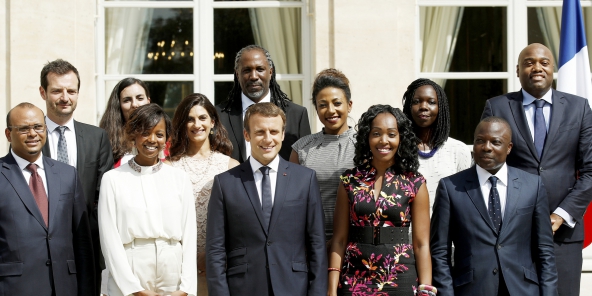Looking for ways to facilitate access to funding, the Presidential Council for Africa collected requests, questions and some criticism during a public debate in Bordeaux.
An equation made impossible. For its return to an audience in the flesh, the Presidential Council for Africa (CPA) has given itself the imposing challenge of questioning in the same way the public so composite of “the entrepreneurship of diversity and diasporas”.
Gathered on September 26, members of the CPA, figures from Aquitaine and Ile-de-France entrepreneurship and representatives of support structures attempted to survey a public in a hurry to voice their expectations. Ultimately, it was this audience that questioned today’s topic the most.
The populations of the between-two continents have seen the impossibility of adding together Africans established in France, French people established in Africa or wishing to do so, young people, older people (or not) of immigration and coming (or not) from “neighborhoods” and “diversity”… Held in Bordeaux, the debate was to compensate for the cancellation due to the health crisis of the Africa France Summit which was to take place there in June.
Listening to audiences and their problems is a necessity for entrepreneurs who all seek to publicize their situation and their challenges. They answered them themselves, starting with those versed in the challenges of the 1500 political districts of the city (QPV).
The Agence France entrepreneur, now part of BPI France, had signaled as an emergency under the chairmanship of Mohed Altrad the very low share (5%) of the 2.7 billion euros allocated to QPVs that reach their target.
For Abdésamad Baazizi, president of Anje Aquitaine (National Association of Young Entrepreneurs), this lack of impact is first and foremost a problem of intermediation. Support, while it does not seem to be lacking, escapes many possible beneficiaries. Moussa Camara, president of the Determined, testifies that at 21 he was unaware of the existence of a support ecosystem: “A strong network was lacking when I started to help me”. He would like to see the number of interlocutors reduced (Anje, ADIE, BPI, etc.) and make them more visible.
Do not add labels to prejudices!
The CPA Coordinator, Wilfrid Lauriano do Rego, echoes that the density of businesses is half as low in QPVs as elsewhere, despite strong potential and needs. But even those in Seine-Saint-Denis who know the path of Bond’Innov do not want to remain identified there and look elsewhere, towards Paris and internationally.
Like many entrepreneurs, they aspire to join the well-known Station F (university campus) which, according to one participant, represents “access to excellence”. However, the CPA wanted to hear from all the populations of the between two continents and there was no shortage of testimonies to remind people that incubators are a must everywhere.
Seeds of entrepreneurs in Tunis and the African Startup Forum in Abidjan welcome, as much as Bond’Innov, profiles in search of solutions for entrepreneurship on site or in several countries. The representatives of the diasporas gave voice to find a place in the conversation and give an identity to their experience of “first generations” in France, distinct but just as problematic as that of “neighborhoods”.
Diasporas, of course, are African entrepreneurs who operate between their country and Europe. They question a term that only adds another label to them. To refocus the discussion around funding, a rant from Diana Brondel, founder of Xaalys: “Tired of misery”
She who is “from the diaspora, a black woman financed mainly by white men” fixes the problem of access to capital in earnest. She puts her finger on the difficulty where circles intersect: who to take the risk of financing and guaranteeing the project leaders who want to operate both in France and in Africa? Early support remains the strongest common demand.
Insufficient commitment from banks!
The President of the Council of African Diasporas in France, Serge Bakoa, reminds us: seed money, or leverage capital, is the “soft underbelly” of funding support.
Devices such as the savings account for co-development or the AFD (French Development Agency) project and debt reduction contracts are not enough. “The difficulty increases further”, adds Aziz Senni, president of C Mon Taxi, “for the entrepreneur who would like to go from France to Africa” and who then discovers banking establishments which are nevertheless familiar which no longer know him and impose on him to become a new customer again.
The culture of banks, or rather bankers, poses problems of empathy, of experience, and “we should be able to see people who look a bit like us”, asks Bubacar Diallo, founder of the Bordeaux company Benoo Energies. He recounts the difficulty of demonstrating the existence of profitable markets in Africa to banks who fully discover these projects and certain territories.
For him, investors themselves would benefit from presenting “more diversity and the desire to reintegrate us into a traditional system without putting a diaspora buffer on us”. In the audience, the owner of a French equipment trading company to Africa confirms BPI France’s reluctance to invest in her business.
A speaker during the public debate of the CPA in Bordeaux!
The leader of a Franco-Moroccan cooperative is urged to review her plan to “only finance the French side, but I am creating jobs on both shores, and I risk dropping the deal”. Collective request is addressed to the CPA: to obtain from the public authorities the creation of a one-stop shop for the training and financing of entrepreneurs who have the ambition of both continents. Will he be able to do so when he seems to have trouble translating the diversity of his interlocutors?
Despite everything, Wilfrid Lauriano do Rego intends to accomplish his mission. He assured “understand everyone’s expectations”, even those who “are in the tech and felt that they were brought back to the neighborhoods”.
The CPA runs the risk of disappointing the expectations of its public if it does not soon provide proof of the lifts promised to the French executive. To change course, there are still three upcoming meetings in Marseille, Lyon and Paris.

